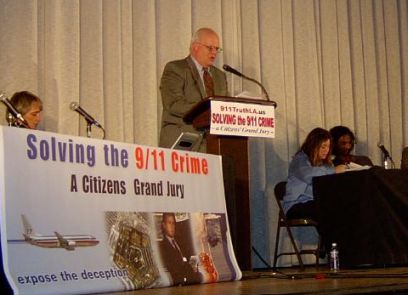
|
NEDERLANDS | ENGLISH
|
|
|
29 September 2005 |
 mail this article
| mail this article
|
 print
| print
|  
This article is part of the series: The coming war against Iran
[ 1 - 2 - 3 - 4 - 5 - 6 - 7 - 8 - 9 - 10 - 11 - 12 - 13 - 14 - 15 - 16 - 17 - 18 - 19 - 20 - 21 - 22 - 23 - 24 - 25 - 26 - 27 - 28 - 29 - 30 - 31 - 32 - 33 - 34 - 35 - 36 - 37 - 38 - 39 - 40 - 41 - 42 - 43 - 44 - 45 ]
The coming war against Iran - Part 2
Webster Tarpley: Staged attack to precede war
By Daan de Wit
Psychological manipulation and military plans are now being fine-tuned and put into place in order to carry out a war against Iran. This manipulation of the public at large strongly resembles preparations taken prior to the current war in Iraq, giving rise to suspicions of a potential diversionary tactic by the U.S. military. At the same time that pressure to pull the troops out of Iraq is intensifying, the U.S. is dispatching an entire division there, possibly to employ against Iran at a later date. According to author Webster Tarpley, the coming war in Iran will be preceded by a false flag operation (a strike carried out by Party A, who is both victim and perpetrator, but who in turn assigns guilt to Party B). He identifies three probable dates on which a war against Iran could begin. The Dutch in the original article has been translated into English by Ben Kearney. 'Entire 101st Airborne Division Deploying to Iraq' was the report released last Friday by any number of relatively small news outlets in the U.S. on the Screaming Eagles, stationed in Fort Campbell, Kentucky. 'The 101st Airborne Division is once again answering the call to serve in Iraq. Around 20,000 soldiers got their final briefing Friday afternoon at Ft. Campbell. It's been two years since the division was last deployed to Iraq. Soldiers will board planes and be heading off Friday to do numerous duties, including helping train Iraqi law enforcement. Families took the afternoon to say goodbye. This is just the 5th time in the history of the 101st that the entire division has been deployed all at once. The soldiers will be gone a year', reports Nashville's NewsChannel5. U.S. sends highly qualified units to Iraq Tarpley: In order to deploy to Iran With the demand rising from all sides to pull out the troops, the U.S. will be sending an additional 20,000 soldiers to Iraq any day now, a substantial number considering a total deployment of 153,000 G.I.'s. The 101st Airborne's assignment is described as 'numerous duties, including helping train Iraqi law enforcement", a task that would seem to underestimate this unit. 'The 3rd Brigade "Rakkasans" will be the first 101st Airborne Division combat troops to step into Iraq this fall. They begin flying out this week', reports The Leaf Chronicle of Clarksville, TN on September 16th. The Rakkasans define their mission as follows: 'Deploy within 36 hours worldwide as part of a joint multinational, or unilateral task force and destroy enemy forces or seize and retain terrain, to control land, people and resources.' And as GlobalSecurity confirms, the might of the 101st is not to be taken lightly: 'In August, 1990 the Iraqi Army invaded Kuwait. The US responded by deploying troops to Saudi Arabia. with one the first units to deploy being the 101st. The division fired the first shots of "Desert Storm" by taking out Iraqi radar sites on 17 January 1991. After the ground war began, the 101st was ordered to go deep into Iraq and set up a base of operations for further attacks. During the ground war phase of "Desert Storm," the 101st made the longest and largest Air Assault in history.' In addition, the 101st Airborne assisted in the killing of Saddam's sons, Uday and Qusay.  Put simply, how plausible is it that an Army unit of this stature has been relegated to such routine duty? Author Webster Tarpley describes a similar situation in one of his articles, which are central to this series. In the article he cites an example from 'the August 18 edition of The Washington Post. Here we are informed by staff writer Bradley Graham that 700 members of the 1st battalion, 504th Parachute Infantry Regiment of the 82nd Airborne Division will be going to Iraq soon.' The troops are ostensibly being deployed so as to provide increased security in the wake of an expanding prison population in Iraq. Tarpley: 'To see the absurdity of this cover story, we need only recall that paratroopers are by definition among the most highly trained elite shock troops, whose main purpose is to carry out offensive operations behind the lines of an enemy. To use them for defensive operations is a waste. Unless the Pentagon generals have gone mad as hatters on the tactical plane as well as the strategic one, they would know that the many hundreds of thousands of dollars it costs to train a paratrooper will be quickly lost if that trooper is required to act for any length of time as a prison guard, detainee convoy escort, or garrison soldier around a prison. Paratroopers must train as paratroopers or they soon cease to be paratroopers and become useless. These paratroopers and others being shipped to Iraq are earmarked for use in the upcoming attack on Iran, the only possible offensive use for such troops at the present time. The US press is now full of falsifications of this puerile character.' About the deployment of the 101st Airborne Division Tarpley writes DeepJournal in an email: 'They are getting ready for the punitive expedition into Iran to go down into the bunker systems and blowup the nuclear and scientific capabilities with explosives in a pinpointed way which simply cannoty be done from the air.' Psychological conditioning for war in Iran similar to Iraq According to Western sources, Iran is still years away from the capability to produce a nuclear weapon. 'Iran Is Judged 10 Years From Nuclear Bomb', read the headline in the Washington Post early last month: 'The carefully hedged assessments, which represent consensus among U.S. intelligence agencies, contrast with forceful public statements by the White House.' As witnessed during the lead-up to the war in Iraq, a familiar pattern of exaggerating the military capacity of the enemy is beginning to repeat itself. Another pattern is the lack of evidence: 'Administration officials have asserted, but have not offered proof, that Tehran is moving determinedly toward a nuclear arsenal.' The Sunday Times reports that 'Israel has drawn up secret plans for a combined air and ground attack on targets in Iran if diplomacy fails to halt the Iranian nuclear programme.' The threat of using force in the event that diplomacy fails, is an act in a production on the world stage that we have seen before and are seeing once again. The Hindu, a national newspaper in India, researched the accusations leveled at Iran, including claims about its nuclear capability, for an article that begins with this sentence: 'Barely two years after the United States invaded Iraq in the name of weapons of mass destruction which never existed, the world is being pushed towards a confrontation with Iran on a similarly flawed premise.'  Ex-Labour Minister Tony Benn writes: 'Some influential Americans appear to be convinced that the US will attack Iran. Whether they are right or not, the build-up to a new war is taking exactly the same form as it did in 2002. First we are being told that Iran poses a military threat, because it may be developing nuclear weapons. We are assured that the President is hoping that diplomacy might succeed through the European negotiations which have been in progress for some months. This is just what we were told when Hans Blix was in Baghdad talking to Saddam on behalf of the UN, but we now know, from a Downing Street memorandum leaked some months ago, that the decision to invade had been taken long before that. That may be the position now, and I fear that if a US attack does take place, the prime minister will give it his full support. And one of his reasons for doing so will be the same as in Iraq: namely the fear that, if he alienates Bush, Britain's so-called independent deterrent might be taken away. For, as I also learned when I was energy secretary, Britain is entirely dependent on the US for the supply of our Trident warheads and associated technology. They cannot even be targeted unless the US switches on its global satellite system.' Ex-Labour Minister Tony Benn writes: 'Some influential Americans appear to be convinced that the US will attack Iran. Whether they are right or not, the build-up to a new war is taking exactly the same form as it did in 2002. First we are being told that Iran poses a military threat, because it may be developing nuclear weapons. We are assured that the President is hoping that diplomacy might succeed through the European negotiations which have been in progress for some months. This is just what we were told when Hans Blix was in Baghdad talking to Saddam on behalf of the UN, but we now know, from a Downing Street memorandum leaked some months ago, that the decision to invade had been taken long before that. That may be the position now, and I fear that if a US attack does take place, the prime minister will give it his full support. And one of his reasons for doing so will be the same as in Iraq: namely the fear that, if he alienates Bush, Britain's so-called independent deterrent might be taken away. For, as I also learned when I was energy secretary, Britain is entirely dependent on the US for the supply of our Trident warheads and associated technology. They cannot even be targeted unless the US switches on its global satellite system.'Cheney and Rumsfeld warn of second September 11th As we reported in part 1 of this series, the American Vice-President Dick Cheney has directed the Pentagon to draw up plans for a preemptive nuclear strike in the event of a 9-11-style incident. Webster Tarpley points to recent statements made by Defense Secretary Rumsfeld that were remarkably similar to those made by Cheney, though expressed somewhat differently: 'Think constantly and urgently about 10/12, he [Rumsfeld] reportedly tells Pentagon staffers in private meetings -- and what you will wish you had done to prevent it. [...] The 10/12 reference is Rumsfeld's epigrammatic way not of predicting the date of a new terror attack but of emphasizing that the horror of 9/11 is likely to be repeated and augmented. It is a chilling symbol of the broad challenge that Bush must now confront', writes Jim Hoagland in The Washington Post.' Webster Tarpley:
____________________________________________________________________________
DeepJournal Sign up for the free mailing list. |